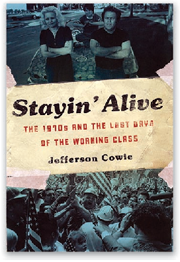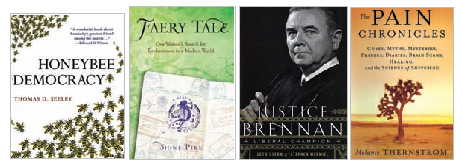Stayin' Alive by Jefferson Cowie (New Press)
Stayin' Alive

by Jefferson Cowie (New Press)
"Within the gloomy Seventies we can find the roots of our own time," asserts Cowie, an associate professor of labor history at Cornell. The decade marked the end of an elusive ideal: "the conscious, diverse, and unified working class acting as a powerful agent in political, social, and economic life." Music and films celebrated escape. Issues from Vietnam, stagflation, racial backlash, and the closing of industrial plants battered the promise of the New Deal and the Great Society. Cowie believes that the working-class dream of basic economic security as the foundation of a greater freedom remains a dream deferred.
Honeybee Democracy by Thomas D. Seeley (Princeton). Cornell professor of neuro-biology and behavior Seeley shows how honeybees hold a democratic debate when choosing new homes. Scouts dance to impart their information about the best sites, and the swarm moves when it reaches consensus. Working together without an overseer, they create a whole whose abilities transcend those of its parts. "The reality of honeybee swarms making good decisions shows us that there really are ways to endow a group with a high collective IQ," says Seeley. "There are intriguing similarities between honeybee swarms and primate brains in the ways that they process information to make decisions."
Justice Brennan by Seth Stern '97 (Houghton Mifflin Harcourt). William J. Brennan Jr.'s decisions during his thirty-four years on the Supreme Court, including Baker v. Carr (one man, one vote), Roe v. Wade, affirmative action, the rights of criminal defendants, and the death penalty, have had a profound effect on American politics and still provoke controversy. In their biography of the associate justice, Stern, a reporter for Congressional Quarterly, and co-author Wermiel, a professor of constitutional law at American University, follow Brennan's early career as a Department of Justice attorney and state judge, and examine his work as a "liberal champion" on the Supreme Court.
Faery Tale by Signe Pike '03 (Perigee). In her memoir about the quest for enchantment in the modern world, a former CAM intern and editor at Random House asks, "How might it change the world if we could reclaim some of our magic?" She travels to Glastonbury Tor, the faery bridge on the Isle of Man, the lost Druid mountain of Ireland, and the Scottish Highlands in search of elusive faeries and a way to heal the grief of her father's death. "Faeries can sweep into our lives if we only invite them. Necromancers of the spirit world, they show us how to honor our own magic, myths, and legends."
The Pain Chronicles by Melanie Thern-strom, MFA '92 (Farrar, Straus and Giroux). In the mid-nineteenth century, the discovery of surgical anesthesia transformed pain from a martyrdom to be endured to a biological phenomenon. Thernstrom, the author of The Dead Girl and Halfway Heaven, interweaves the history of medicine's attempts to alleviate suffering with the story of her own search to find a cure for chronic pain. "To be in physical pain," she writes, "is to find yourself in a different realm—a state of being unlike any other, a magic mountain as far removed from the familiar world as a dreamscape."

Fiction
Grumby by Andy Kessler '80 (Richard Vigilante). In the first novel by the author of Wall Street Meat and Running Money, hackers and coders outfit old Furbys with the latest devices, link them in a network, sell them, and become the new high-tech aristocracy.
Siegfried Follies by Richard Alther '62 (Regent). Two orphans, a German and a Jew, form a friendship that survives the horrors of World War II and their struggles to come to terms with guilt and betrayal.
Non-Fiction
Sizing Up the Universe by J. Robert Gott and Robert J. Vanderbei, PhD '79 (National Geographic). Two Princeton professors present new research into the massiveness of planets, stars, and galaxies using scaled maps, photographs, and object comparisons to demonstrate actual size.
Hunger by John R. Butterly '70 and Jack Shepherd (Dartmouth). Butterly, an associate professor of medicine at Dartmouth Medical School, and his co-author examine the biology, history, economics, and politics of malnutrition and offer solutions for providing food security.
Arsenic and Clam Chowder by James D. Livingston '51 (Excelsior). The 1896 trial of Mary Alice Livingston for murdering her mother with poison was one of the most notorious criminal cases of New York City's Gilded Age. Her story touches upon capital punishment, equal rights for women, biased juries, and the question of reasonable doubt.
How to Raise Your Adult Children by Gail Parent and Susan Ende '65, MA '70 (Hudson Street). What should parents do if their grown child comes home after college graduation? A writer and a psychotherapist give practical advice on handling difficult emotional and financial situations when adults return to the nest.
Debate of the Romance of the Rose translated by David F. Hult, PhD '77 (Chicago). A professor of French at UC Berkeley collects and translates medieval writer Christine Pizan's criticisms of misogynistic depictions of women in the then-popular Romance of the Rose.
Dr. Peter Scardino's Prostate Book by Peter Scardino and Judith Kelman '67 (Avery). A detailed guide for men about prostate health, risk factors for prostate cancer, and the best options for treatment and prevention by Scardino, chairman of the Department of Surgery at Memorial Sloan-Kettering Cancer Center, and mystery novelist Kelman.
Gay Bar by Will Fellows '83, MS '85, and Helen P. Branson (Wisconsin). Fellows supplies historical and cultural commentary on the lives of gay men in this new edition of Helen Branson's memoir about operating a gay bar in Fifties Los Angeles.
Activists in City Hall by Pierre Clavel (Cornell). A professor in Cornell's Department of City and Regional Planning tells how progressive neighborhood activists went into city halls in Boston and Chicago in the Eighties and changed the way those cities were governed.
The First Prejudice edited by Chris Beneke '94 and Christopher S. Grenda (Penn). In this collection, historians examine religious tolerance and intolerance in early America. Beneke is an associate professor of history at Bentley University.
The Joyful Professor by Barbara Minsker '86, PhD '95 (MavenMark). A guide to help academics strike a balance between work and life, by a professor of civil and environmental engineering at the University of Illinois, Urbana-Champaign.
Projections of Power by Anne L. Foster, PhD '95 (Duke). An assistant professor of history at Indiana State University analyzes the contradiction between America's anti-colonial rhetoric and its imperialistic expansion in the Philippines and Southeast Asia before World War II.
Soup by Jon Gordon '93 (Wiley). Gordon, a consultant, motivational speaker, and author of The Energy Bus, offers a recipe for leaders who want to boost employee morale and create a successful business culture.
Creating the School You Want by Arthur Shostak '58 (Rowman & Littlefield). A sociologist, school consultant, and leader in the World Future Society argues that education must look beyond the narrow focus of today and concentrate on the future.
Smog Check by Douglas Eisinger '81 (RFF Press). The director of transportation policy and planning at Sonoma Technology explores the conflict between the EPA and the State of California over auto emissions testing after passage of the 1990 Clean Air Act Amendments.
Children's
All the Seasons of the Year by Deborah Lee Rose '77, illustrated by Kay Chorao (Abrams). A mother shows her love for her child through the four seasons.


